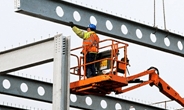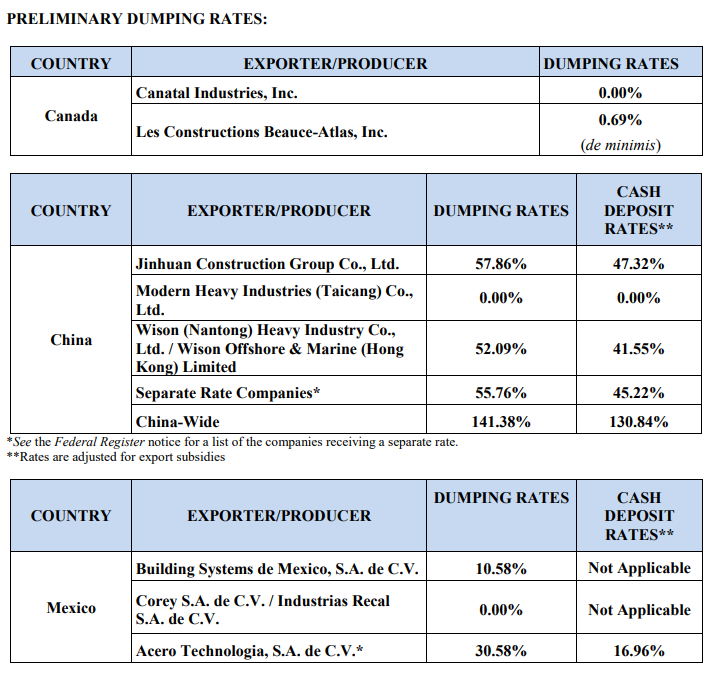Government/Policy

September 5, 2019
DOC Issues Preliminary AD Determinations on Fabricated Structural Steel
Written by John Packard
On Wednesday, September 4, 2019 the U.S. Department of Commerce issued a Preliminary Antidumping Duty Determinations on fabricated structural steel from Canada, China and Mexico. In the determination Canada was found to be essentially harmless while China and Mexico were found to be dumping fabricated steels into the U.S. markets.
SMU normally does not cover fabricated structural steels. However, during the 2019 SMU Steel Summit Conference this topic came up as a question from the audience. The subject was addressed by Lewis Leibowitz and others on our trade panel. The implications from this antidumping investigation may be more far-reaching than what it looks like on the surface.
Trade attorney Lewis Leibowitz will have more on this subject in Sunday evening’s issue of Steel Market Update.
Here is what the U.S. Department of Commerce released to the media late yesterday:
Wednesday, September 4, 2019
U.S. Department of Commerce Issues Preliminary Antidumping Duty Determinations on Fabricated Structural Steel from Canada, China, and Mexico
WASHINGTON – Today, the U.S. Department of Commerce announced the affirmative preliminary determinations in the antidumping duty (AD) investigations of imports of certain fabricated structural steel from China and Mexico, finding that exporters from China and Mexico have dumped fabricated structural steel in the United States at margins ranging from 0.00 percent to 141.38 percent and 0.00 percent to 30.58 percent, respectively. The Department also announced a negative preliminary determination in the AD investigation of certain fabricated structural steel from Canada.
As a result of today’s decisions, Commerce will instruct U.S. Customs and Border Protection to collect cash deposits from importers of fabricated structural steel from China and Mexico based on the preliminary rates noted above.
In 2018, imports of fabricated structural steel from Canada, China, and Mexico were valued at an estimated $722.5 million, $897.5 million, and $622.4 million, respectively.
The petitioner is the American Institute of Steel Construction Full Member Subgroup (Chicago, IL).
The strict enforcement of U.S. trade law is a primary focus of the Trump Administration. Since the beginning of the current Administration, Commerce has initiated 182 new antidumping and countervailing duty investigations – a 231 percent increase from the comparable period in the previous administration.
Antidumping and countervailing duty laws provide American businesses and workers with an internationally accepted mechanism to seek relief from the harmful effects of the unfair pricing of imports into the United States. Commerce currently maintains 492 antidumping and countervailing duty orders which provide relief to American companies and industries impacted by unfair trade.
Commerce is scheduled to announce the final determinations in these investigations on or about January 24, 2020.
If Commerce’s final determinations are affirmative, the U.S. International Trade Commission (ITC) will be scheduled to make its final injury determinations on or about March 9, 2020. If Commerce makes affirmative final determinations of dumping, and the ITC makes affirmative final injury determinations, Commerce will issue AD orders. If Commerce makes negative final determinations of dumping, or the ITC makes negative final determinations of injury, the investigations will be terminated and no orders will be issued.
[fact sheets located below]
The U.S. Department of Commerce’s Enforcement and Compliance unit within the International Trade Administration is responsible for vigorously enforcing U.S. trade law and does so through an impartial, transparent process that abides by international law and is based on factual evidence provided on the record.
Foreign companies that price their products in the U.S. market below the cost of production or below prices in their home markets are subject to antidumping duties. Companies that receive unfair subsidies from their governments, such as grants, loans, equity infusions, tax breaks, or production inputs, are subject to countervailing duties aimed at directly countering those subsidies.
SMU Note: Here is a copy of the fact sheets for all three countries:








